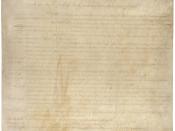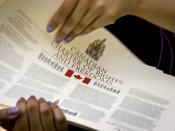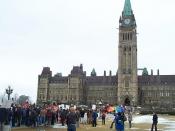Today's Canadian students, who are privileged in many ways, do not spend a lot of time thinking about what freedom means for them or about Canada's long history of freedom fighting. There are many events throughout the history of Canada's existence that have been infringements on the rights of its citizens. The internment of the Japanese Canadians is a prime example of one of these historical injustices. The 1982 Canadian Charter of Rights and Freedoms was a document that was created to prevent anything like this from ever happening again. Since then Canada has been known as a free country, but this is not necessarily the case. Laws of all sorts tamper with our thoughts of freedom. Although Canada may be seen as a free country, there are many restrictions that limit the amount of freedom we may think we have.
Today, the internment of Japanese Canadians is seen as slash across Canada's reputation.
Canada was known to be an accepting country that treated everyone equally and promoted multiculturalism. Shortly after Japan's entry into World War II on December 7, 1941, Japanese Canadians were removed from the West Coast of Canada. "This was seen as a military necessity and was used as a justification for their mass removal and incarceration." Canada made a controversial decision to detain all Japanese Canadians until the war was over. Because of this discriminatory act Japanese Canadians fought to have their rights given back to them. The Redress Agreement in September of 1988 finally recognized all Japanese Canadians' rights to live in Canada and offered an official apology from the government. The achievement of Redress is a prime example of a group of people trying to gain the rights of all individuals in a democracy.
The 1982 Canadian Charter of Rights and Freedoms states...


